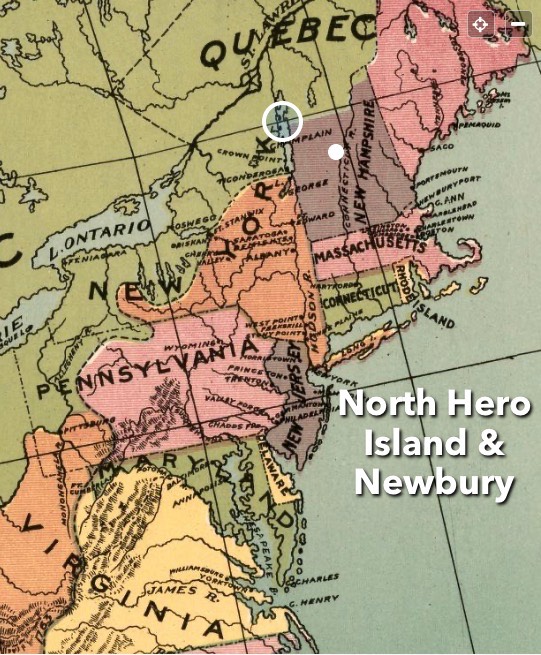An email with a document attached arrived from Lovewell descendant Scott Pierce, complete with a ready-made marketing blurb:
Spies, kidnapping plots, and double-agents. It seems to be right up your alley!
Not only is it a tale of frontier espionage and skullduggery, but one populated with such familiar historical names as Chamberlain, Bedel, Taplin and Sylvester. As a bonus, Col. Nehemiah Lovewell himself makes a guest-appearance near the end, with the collar of his trench coat turned up and the brim of his fedora snapped down.
Unlike so many of today’s action-adventure stories, this lived up to the hype.
Published by the Vermont Historical Society in America’s centennial year, J. Robert Maguire’s “The British Secret Service and the Attempt to Kidnap General Jacob Bayley of Newbury, Vermont, 1782,” takes a chapter from Frederic P. Wells’ 1902 History of Newbury, Vermont, and fleshes it out with additional sources and juicy quotes, mostly from the British side.

The spymaster of the tale is Capt. Justus Sherwood, who was given the mission of steering the newly-formed Republic of Vermont into King George’s column. General Bayley, a hero of the French and Indian War, was a diehard opponent of reconciliation with Britain, one who had to be silenced one way or the other. Plans were laid to kidnap Bayley and bring him to Canada, or failing that, to kill him and make off with his papers.
Sherwood had established his headquarters on Lake Champlain’s North Hero Island at the northwest corner of Vermont, a short hop to the Province of Quebec. As Sherwood boasted, “there is not so proper a place on the frontiers as this for the residence and departure of secret scouts.” Sherwood was pleased to report that at one moment there were at least “47 men in different parts of the rebel frontier on secret service.”
General Bayley was the most valuable prize in Vermont, but he was not the only target of the British secret service that summer. Seven scouting parties were dispatched in all, including one with instructions to kidnap Gen. Philip Schuyler
With the outcome of the war still uncertain, the countryside of Vermont was host to a nest of intrigue and divided loyalties. We might imagine Casablanca in 1943, West Berlin in the Cold War, or James Bond kneeling over a corpse at the Hagia Sophia as he quips, “Let’s just say Istanbul is a rough town.”
The most feared scoundrel in Capt. Sherwood’s stable of spies was surely Joseph Bettys of the King’s Rangers, described as “an ungovernable desperado… a shrewd, intelligent, daring and bad man… pity and mercy were emotions which he never felt; his career was marked by almost every enormity that can disgrace a human being. His very name struck terror, and a record of his enterprises and crimes would fill a book. He burned the dwellings of persons whom he hated, or took them off by murder… He scorned disguise or concealment. He fell upon his victims at noon as well as midnight.”
Apparently cut from roughly the same cloth, though blessed with a winning personality, was the man leading the group appointed to nab Gen. Bayley at Newbury, Capt. Azariah Pritchard. Equally as cunning and ruthless as Bettys, the convivial Pritchard apparently won over his captives, most agreeing they had been treated fairly under the circumstances. Bettys, on the other hand, was arrested by his own employers for kidnapping a female hostage during his failed mission and refusing to give her up. Later in the war he would swing from a gallows when caught smuggling coded messages into upstate New York.
None of the seven teams dispatched from North Hero Island that summer returned with the man they were after, partly because a deserter from one of the teams began spreading an alarm along the frontier.
As for those famous names caught up in the fallout after the failed raid, Thomas Chamberlain of Topsham was the first neighbor arrested. Hearing that Chamberlain was in custody and telling all he knew, Col. John Taplin of Corinth immediately fled to Canada. Chamberlain’s testimony implicated Timothy Bedel. It appears that Bedel, Taplin, Chamberlain, Levi Sylvester, and several more conspirators had taken part in planning the raid on and off for several months. It was a daring plan with far too many cooks who squabbled over strategy and timing beforehand, and then squabbled over blame, pointing fingers every which way when the plan fell apart.
At his safehouse on North Hero Island, Spymaster Capt. Justus Sherwood sadly concluded that “the business of procuring intelligence has with some become a consideration of self interested views, rather than the promotion of his Majesty’s service.”
Shortly after the bungled Bayley kidnapping attempt, two of Azariah Pritchard’s agents had visited Col. Taplin’s house in Corinth to gather intelligence in the aftermath. Col. Nehemiah Lovewell arrived and asked one of the men to speak with him outside. As they strolled together in the woods Lovewell revealed the identity of the man who had warned Bayley in time to make his escape. Capt. Pritchard’s timing had been fortunate, in a way, Lovewell suggested. Had he arrived fifteen minutes later, the guard at Bayley’s house would have been strengthened by the arrival of twenty-five local men who were ready to put an end to Pritchard’s career.
“We had a friend that we made use of, with two coats,” Lovewell explained. It’s just possible that Mr. Lovewell had an extra coat hanging in his closet as well.
Although Newbury’s official historian Frederic P. Wells did not cite British sources in his 1902 volume, he knew enough sensitive details to warn readers that “the pride of many families would be wounded could they know what the Canadian archives can reveal.”
Ouch.